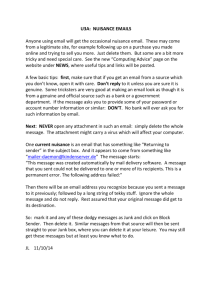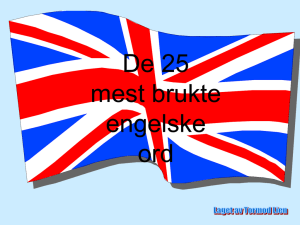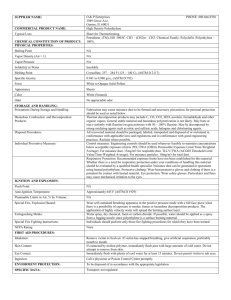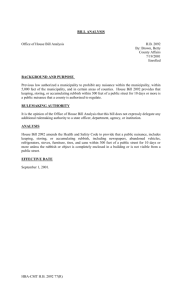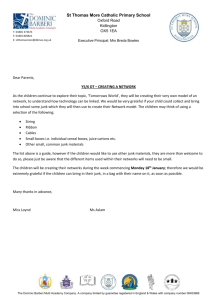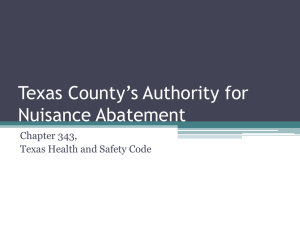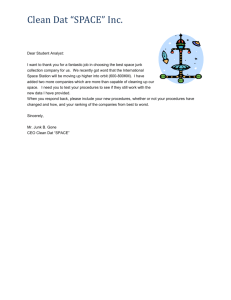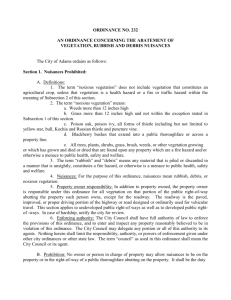title 5 - health and sanitation
advertisement
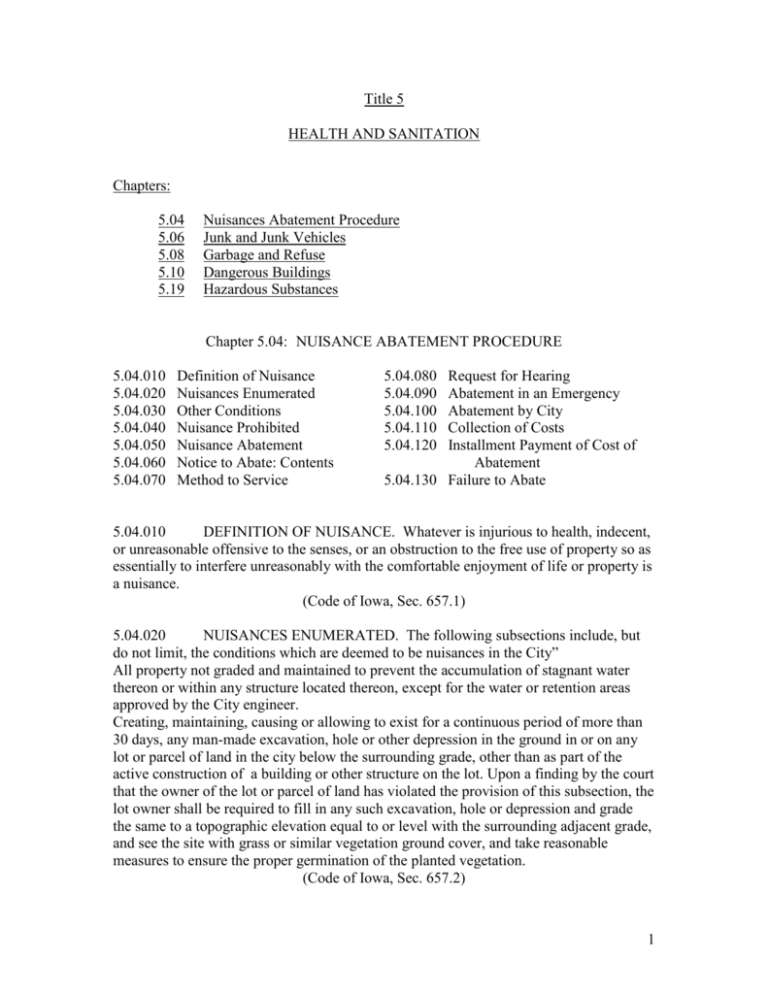
Title 5 HEALTH AND SANITATION Chapters: 5.04 5.06 5.08 5.10 5.19 Nuisances Abatement Procedure Junk and Junk Vehicles Garbage and Refuse Dangerous Buildings Hazardous Substances Chapter 5.04: NUISANCE ABATEMENT PROCEDURE 5.04.010 5.04.020 5.04.030 5.04.040 5.04.050 5.04.060 5.04.070 Definition of Nuisance Nuisances Enumerated Other Conditions Nuisance Prohibited Nuisance Abatement Notice to Abate: Contents Method to Service 5.04.080 5.04.090 5.04.100 5.04.110 5.04.120 Request for Hearing Abatement in an Emergency Abatement by City Collection of Costs Installment Payment of Cost of Abatement 5.04.130 Failure to Abate 5.04.010 DEFINITION OF NUISANCE. Whatever is injurious to health, indecent, or unreasonable offensive to the senses, or an obstruction to the free use of property so as essentially to interfere unreasonably with the comfortable enjoyment of life or property is a nuisance. (Code of Iowa, Sec. 657.1) 5.04.020 NUISANCES ENUMERATED. The following subsections include, but do not limit, the conditions which are deemed to be nuisances in the City” All property not graded and maintained to prevent the accumulation of stagnant water thereon or within any structure located thereon, except for the water or retention areas approved by the City engineer. Creating, maintaining, causing or allowing to exist for a continuous period of more than 30 days, any man-made excavation, hole or other depression in the ground in or on any lot or parcel of land in the city below the surrounding grade, other than as part of the active construction of a building or other structure on the lot. Upon a finding by the court that the owner of the lot or parcel of land has violated the provision of this subsection, the lot owner shall be required to fill in any such excavation, hole or depression and grade the same to a topographic elevation equal to or level with the surrounding adjacent grade, and see the site with grass or similar vegetation ground cover, and take reasonable measures to ensure the proper germination of the planted vegetation. (Code of Iowa, Sec. 657.2) 1 1. Offensive Smells. Erection, continuing or using any building or other place for the exercise of any trade, employment or manufacture, which, by occasioning noxious exhalations, unreasonably offensive smells, or other annoyances, becomes injurious and dangerous to the health, comfort or property of individuals or the public. 2. Filth or Noisome Substance. Causing or suffering any offal, filth or noisome substance to be collected or to remain in any place to the prejudice of others. 3. Impeding Passage of Navigable River. Obstruction or impeding without legal authority the passage of any navigable river, harbor or collection of water. 4. Water Pollution. Corruption or rendering unwholesome or impure the water of any river, stream or pond, or unlawfully diverting the same from its natural course or state, to the injury or prejudice of others. 5. Blocking Public and Private Ways. Obstructing or encumbering, by fences, buildings or otherwise, the public roads, private ways, streets, alleys, commons, landing places or burying grounds. 6. Billboards. Billboards, signboards and advertising signs, whether erected and constructed on public or private property, which so obstruct and impair the view of any portion or part of a public street, avenue, boulevard or alley or of a railroad or street railway track as to render dangerous the use thereof. 7. Storing of Flammable Junk. Depositing or storing of flammable junk, such as old rags, rope, cordage, rubber, bones, and paper, by dealers in such articles within the fire limits of the City, unless in a building of fireproof construction. (Also see Chapter 5.06) 8. Air Pollution. Emission of dense smoke, noxious fumes or fly ash. 9. Grass, Weeds and Brush. Dense growth of all weeks, vines, brush or other vegetation so as to constitute a health, safety or fire hazard. The allowable maximum height of grass and/or weeds shall be six (6) inches in developed residential, commercial and industrial zoned districts, twelve (12) inches in undeveloped residential, commercial and industrial districts, and eighteen (18) inches in unplatted districts other than agricultural districts. The property owner and occupant are jointly and severally responsible for mowing die abutting space between the lot live and the curb line or edge of the traveled portion of the street right-of-way and one-half of any alley abutting the property. A lot may be exempted from the foregoing provision of the following conditions: a. All owners of property abutting such lot must consent in writing. b. A firebreak thirty (30) feet in width on all sides of such lot shall be mowed to the height of not more than eight (8) inches. 2 c. The lot shall contain no “noxious weeds” as defined in Section 317.1, Code of Iowa. d. The property owners shall assume in writing all liability for such condition and indemnify the City for any claims or damages related thereof. 10. Dutch Elm Disease. Trees infected with Dutch Elm Disease. 11. Airport Air Space. Any object or structure hereafter erected within one thousand (1,000) feet of the limits of any municipal or regularly established airport or landing place, which may endanger or obstruct aerial navigation including takeoff and landing, unless such object or structure constitutes a proper use of enjoyment of the land on which the same is located. 12. House of Ill Fame. Houses of ill fame, kept for the purpose of prostitution and lewdness; gambling houses; places resorted to by persons participating in criminal gang activity prohibited by Chapter 723A of the Cody of Iowa or places resorted to by persons using controlled substances, as defined in Section 124.101 of the Code of Iowa, in violation of law, or houses where drunkenness, quarreling, fighting or breaches of the peace are carried on or permitted to the disturbance of others. 13. Ground Cover Required. Property in a residential area shall be seeded, sodded or otherwise planted with a ground cover not more than thirty (30) days after construction is completed, unless impractical, but not later than the beginning of the next growing year. 14. Machinery and Household Goods. No furniture, household furnishings, appliances, or other such items not designed for outside use and no machinery, implements, or other such equipment which is in an inoperable condition, including component parts thereof, shall be stored or kept outside for a period of more than twentyfour (24) hours on any premises in a residential area, excluding the week prior to a declared official cleanup program. 15. Construction Equipment and Materials. Operable machinery, equipment and materials being used for construction purposes, including pipes, lumber, forms, dirt, sand and sod shall not be stored or kept in the open, except: a. For use in the ordinary course of business as the inventory or asset of a contractor, supplier, or government subdivision if the area where stored or kept is zoned business, commercial or industrial to allow such storage. b. On the job site of project in progress for a period not to exceed thirty (30) days after construction has been completed or a separate certificate of occupancy has been issued, whichever first occurs and in any event for not more than three (3) months unless a building permit has been obtained from the city for a longer period of time. 16. Outside Storage. The following items stored in outdoor areas or in other structures not totally enclosed by structural walls: building materials, abandoned or inoperable vehicles, non-registered vehicles, auto parts, tires, packing boxes, wooden pallets, broken or discarded furniture, broken or discarded household furnishings or equipment including carpeting, appliances and other typical household items, or any item not normally required in the day-to-day use of the property when stored continuously in excess of seventy-two (72) hours within any portion of a front, side or rear yard area. This section applies to all property, regardless of zoning classification. However, this section shall not be construed to prohibit a use specifically permitted by applicable zoning law. 3 17. Junk Stored in Vehicles. Any trailer, pick-up, or other motor vehicle containing an accumulation of or used for storage of junk as defined in Chapter 5.06 which has been stored or parked on public or private property for more than 48 hours. 18. Attractive Nuisance. Any attractive nuisance dangerous to children in the form of abandoned vehicles, abandoned or broken equipment, hazardous pool, ponds, excavations, materials, including building material, debris or neglected machinery. 19. Deteriorated Property. Real property maintained in such condition that it is or becomes defective, unsightly, or in such condition of deterioration or disrepair, including, but no limited to broken or missing windows or doors, brush or trees growing in or near foundation or through porch floors, unshingled or fallen roofs, rotten trim, rotten columns or porches that the same causes substantial depreciation of the properties and improvements, and real property that by reason of fire damage, decay, or lack of maintenance has deteriorated to the extent its fair market value is less than one-half the market value of comparable real property that has not so deteriorated. 20. Discarded Material. Any discarded or unused material on real property that is not consistent with the condition and visual appearance of the surrounding or adjacent real property. 21. Materials on Public Ways. The placing or throwing on any street, alley, road, highway, sidewalk, or other public property of any glass, tacks, nails, bottles, or other substances which may injure any person or animal or damage any pneumatic tire when passing over the same. 22. Garbage and Debris. The depositing of, maintaining, permitting, or failing to remove, garbage, trash, rubbish, bottles, cans and other refuse on any property within the City, including large quantities of organic debris and materials, which accumulated by other than natural mean, except neatly maintained compost piles. 23. Outside Storage. The outside storage of pipes, lumber, forms, machinery or other occupational materials upon property in the front yard or side yard corner lot or visible form a public street in a residential district. 24. Wood Piles. The accumulation of any piles of wood which are not neatly stacked or secured in a stable manner to avoid collapse. 25. Fireworks. All use or display of fireworks except as provided by ordinances. 26. Assembly of People. Any use of property abutting on a public street or sidewalk or any use of a public street or sidewalk which cause large crowds of people to gather, obstruction traffic and the free use of the streets or sidewalks. 27. Anything else defined in the Code of Iowa as a nuisance. The contract purchaser, record holder of legal title, tenant in possession, and/or person or persons who have caused or allowed the existence of a nuisance are jointly responsible under the Allison Municipal Code. 5.04.030 OTHE CONDITIONS. The following chapters of the Code of Ordinances contain regulations prohibiting or restricting other conditions which are deemed to be nuisances: 1. Junk and Junk Vehicles (See Chapter 5.06) 2. Dangerous Buildings (See Chapter 5.10) 4 5.04.040 NUISANCES PROHIBITED. The creation of maintenance of a nuisance is prohibited, and a nuisance, public or private, may be abated in the manner provided for in this chapter or State Law. (Code of Iowa, Sec. 657.3) 5.04.050 NUISANCE ABATEMENT. Whenever the Mayor or other authorized municipal officer finds that a nuisance exists, such officer shall cause to be served upon the property owner a written notice to abate the nuisance within a reasonable time after notice. (Code of Iowa, Sec. 364.12[3h]) 5.04.060 NOTICE TO ABATE: CONTENTS. The notice to abate shall contain: (Code of Iowa, Sec. 364.12[3h]) 1. Description of Nuisance. A description of what constitutes the nuisance. 2. Location of Nuisance. The location of the nuisance. 3. Acts Necessary to Abate. A statement of the act to acts necessary to abate the nuisance. 4. Reasonable time. A reasonable time within which to complete the abatement. 5. Assessment of City Costs. A statement that if the nuisance or condition is not abated as directed by the time specified in said notice, that (a) the City will abate said nuisance or condition and assess the costs against such person, and/or (b) the City will abate such nuisance or condition and if the costs assessed are unpaid after the expiration of the time set forth in the notice sent pursuant to Section 5.04.110 herein, such costs may be certified to the County Treasurer and collected as general property taxed, or (c) said failure to correct will be considered a municipal infraction under Chapter 4 of this Code of Ordinances; that a citation will be issued by the peace officer pursuant to such chapter, that upon hearing, the Judicial Magistrate may impose a civil judgment, order the nuisance abate and assess the costs of abatement against the person maintaining the nuisance or the property upon which the nuisance is maintained. 5.04.070 METHOD OF SERVICE. The notice may be in the form of an ordinance of sent by certified mail to the property owner. (Code of Iowa, Sec. 364.12[3h]) 5.04.080 REQUEST FOR HEARING. Any person ordered to abate a nuisance may have a hearing with the Council as to whether a nuisance exists. A request for a hearing must be made in writing and delivered to the Clerk within the time stated in the notice, or it will be conclusively presumed that a nuisance exists and it must be abated as ordered. The hearing will be before the Council at a time and place fixed by the Council. The findings of the Council shall be conclusive and, if a nuisance is found to exist, it shall be ordered abated within a reasonable time under the circumstances. 5.04.090 ABATEMENT IN EMERGENCY. If it is determined that an emergency exists by reason of the continuing maintenance of the nuisance or condition, the City may perform any action which may be required under this chapter without prior notice. The City shall assess the costs as provided in Section 5.04.110 after notice to the property 5 owner under the applicable provisions of Sections 5.04.050, 5.04.060, and 5.04.070 and hearing as provided in Section 5.04.080. (Code of Iowa, Sec. 364.12[3h]) 5.04.100 ABATEMENT BY CITY. If the person notified to abate a nuisance or condition neglects or fails to abate as directed, the City may perform the required action to abate, keeping an accurate account of the expense incurred. The itemized expense account shall be filed with the Clerk who shall pay such expenses on behalf of the City. Any accumulation of grass, weeds and brush or any combination thereof in violation of 5.04.020(9) on an owner’s property occurring within six months from and after the date of a notice shall be summarily abated by the municipal governing body, and the costs of such abatement shall be assessed against the owner. (Code of Iowa, Sec. 364.12[3h]) 5.04.110 COLLECTION OF COSTS. The Clerk shall send a statement of the total expense incurred by certified mail to the property owner who has failed to abide by the notice to abate, and if the amount shown by the statement has not been paid within one (1) month, the Clerk shall certify the costs to the County Treasurer and such costs shall then b collected with, and in the same manner, as general property taxes. (Code of Iowa, Sec. 364.12[3h]) 5.04.120 INSTALLMENT PAYMENT OF COST OF ABATEMENT. If the amount expended to abate the nuisance or condition exceeds one hundred dollars ($100.00), the City may permit the assessment to be paid in up to ten (10) annual installments, to be paid in the same manner and with the same interest rates provided for assessments against benefited property under State Law. (Code of Iowa, Sec. 364.13) 5.04.130 FAILURE TO ABATE. Any person causing or maintaining a nuisance who shall fail or refuse to abate or remove the same within the reasonable rime required and specified in the Notice to Abate is in violation of this Code of Ordinances, and may be charged with a simple misdemeanor, or charged with a Municipal Infraction, the specific penalties of which Municipal Infraction shall be as followed: 1. First Offense- $150.00 2. Second Offense- $350.00 3. Third Offense- $750.00 4. Fourth or Subsequent Offense- $1,000.00 In addition to a fine or monetary penalty, the Court may order the person to abate or remove the nuisance within a tmie specified and if not removed within the time specified, may authorize the City to remove the same and enter judgment against the person personally and/or against the property where the violation occurred, and collect such costs as authorized by Section 5.04.110. 6 Chapter 5.06 JUNK AND JUNK VEHICLES 5.06.010 5.06.020 5.06.030 Definitions Jun and Junk Vehicles Prohibited Junk and Junk Vehicle a Nuisance 5.06.010 5.06.050 Exceptions Notice to Abate 5.06.010 DEFINITIONS. For the use in this chapter, the following terms are defined: 1. “Junk” means all old or scrap copper, brass, lead, or any other non- ferrous metal; old or discarded rope, rags, batteries, paper, trash, rubber, debris, waste or used lumber, or salvaged wood; dismantled vehicles, machinery and appliances or parts of such vehicles, machinery or appliances; iron steel or other old or scrap ferrous materials; old or discarded glass, tinware, plastic or old discarded household goods or hardware. Neatly stacked firewood located on a side yard or a rear yard is not considered junk. 2. “Junk vehicle” means any vehicle legally placed in storage with the County Treasurer or unlicensed and which has any of the following characteristics: a. Broken Glass. Any vehicle with a broken or cracked windshield, window, headlight or tail light, or any other cracked or broken glass. b. Broken, Loose or Missing Part. Any vehicle with a broken, loose or missing fender, door, bumper, hook, steering wheel or trunk lid. c. Habitat for Nuisance Animals or Insects. Any vehicle witch has become the habitat for rats, mice, or snakes, or any other vermin or insects. d. Flammable Fuel. Any vehicle with contains gasoline or any other flammable fuel. e. Inoperable. Any motor vehicle which lacks an engine or two or more wheels or other structural parts, rendering said motor vehicle totally inoperable or which cannot be moved under its own power or has not been used as an operating vehicle for a period of thirty (30) days or more. f. Defective or Obsolete Conditions. Any other vehicle which, because of its defective or obsolete conditions, in any other way constitutes a threat to the public health and safety. Mere licensing of such vehicle shall not constitute a defense to the finding that the vehicle is a junk vehicle. 3. “Vehicle” means every device in, upon, or by which a person or property is or may be transported or drawn upon a highway or street, excepting devices moved by human power or used exclusively upon stationary rails or tracks, and includes without limitation a motor vehicle, automobile, truck, motorcycle, tractor, buggy, wagon, farm machinery, or any combination thereof. 5.06.020 JUNK AND JUNK VEHICLES PROHIBITED. It is unlawful for any person to store, accumulate, or allow to remain on any private property within the corporate limits of the City any junk or junk vehicle. 7 5.06.030 EXCEPTIONS. The provisions of this chapter do not apply to any junk or junk vehicle stored within: 1. A garage or other enclosed structure; or 2. The premises of a business enterprise operated in a district properly zoned therefor, when necessary to the operation of said business enterprise, as authorized under the Zoning Ordinance of the City (this exception does not permit the business enterprise to store vehicles or allow accumulations of junk in a manner that results in the dense growth of weeds, brush and grasses in and around the vehicles or junk, or allow such vehicles or junk to become a habitat for rats, mice, snakes or any other vermin or insects); or 3. An appropriate storage space or depository maintained in a lawful place and lawful manner by the City for vehicles impounded by the City. 5.06.050 NOTICE TO ABATE. Upon discovery of any junk or junk vehicle located upon private property in violation of Section 5.06.030, the City shall within five (5) days initiate abatement procedures as outlined in Chapter 5.04 of this Code of Ordinances. (Code of Iowa, Sec, 364.12[3a]) Chapter 5.08 GARBAGE AND REFUSE Sections: 5.08.010 5.08.020 5.08.030 5.08.040 5.08.050 5.08.060 5.08.065 5.08.066 5.08.070 5.08.080 5.08.090 5.08.100 5.08.105 5.08.110 5.08.120 5.08.130 Definitions. Accumulation and deposit of refuse prohibited. Duty of person to dispose of refuse. Duty to provide approved containers. Administration. Storage. Separation of yard wastes. Adoption of Additional Procedures. Rules and regulations. Collection. Necessity of permit. Collection of fees. Pay As You Throw Plan Penalty charge. Delinquent fees. Penalty. 5.08.010 Definitions. For the purpose of this chapter, (1) "Approved containers" includes galvanized metal container, watertight, with tight fitting covers approximately thirty-two gallons or less in capacity, with cover handle and side bails Disposable bags manufactured for garbage and refuse disposal are acceptable and recommend a package containing rubbish only, not exceeding four feet in its longest dimension, securely tied with cord or rope of sufficient strength to permit lifting 8 and carrying of the full weight thereof without spillage or leakage and placed for collection immediately adjacent to an approved container. (2) "Bundle" includes a package containing rubbish only, not exceeding four feet in its longest dimension, securely tied with cord or rope of sufficient strength to permit lifting and carrying of the full weight thereof without spillage or leakage and placed for collection immediately adjacent to an approved container. (3) "Charges" means fees, bills or service charges for garbage and rubbish collects. (4) "Garbage" includes animal, vegetable and other wastes resulting from the handling, preparation, cooking and consumption of food and drink. (5) "Person" includes any individual, firm, corporation, trust, and any other organized group, or any government. (6) "Refuse" includes all garbage, rubbish, ashes or other substances offensive to sight or smell, dangerous to the public health or detrimental to the best interests of the community, except dead animals not lolled for food. (7) "Residence" includes a dwelling unit such as a home, trailer, or multi-family dwelling of four or less units. Each unit of a multi-family dwelling shall be considered a separate dwelling unit. (8) "Rubbish" includes all other refuse not falling within the term garbage, except those objects too large to be placed in approved containers. (9) "Yard Waste" means all organic debris, including but not limited to leaves, grass trimmings, tree limbs, bark, branches, flowers or other like organic waste products grown or produced as part of a yard or garden or as part of maintaining the same. (Ord. §1, 1990; Ord. 146 §1, 1974). 5.08.020 Accumulation and deposit of refuse prohibited. No person shall permit refuse to accumulate upon premises owned or occupied by him unless in approved containers; nor shall he deposit refuse on any other premises unless in such a container. Any such container shall be kept clean and shall not be left in alleys or streets. (Ord. 146 §2, 1974). 5.08.030 Duty of person to dispose of refuse. Each person shall dispose of all refuse accumulating on any premises he owns or occupies before it becomes a nuisance. If it does become a nuisance, the local health officer and council shall deal with it as provided in the Iowa Code. (Ord. 146 §3, 1974). 5.08.040 Duty to provide approved containers. Each person shall provide approved containers for the storage of garbage and rubbish accumulating on the premises owned or occupied by him. Such containers shall be kept covered and reasonably clean at all times. They shall be in a position readily accessible to the collector. It shall be the duty of the owner of each household residing in a building arranged for more than one family unit to provide himself with proper containers for garbage and rubbish, unless an approved container or master container has been provided by the building owner. (Ord. 146 §4, 1974). 5.08.050 Administration. Administration of this chapter shall be by the mayor, or such employee designated by him. (Ord. 146 §5, 1974). 9 5.08.060 Storage. All garbage must be drained and that accumulating from dwellings must be wrapped in paper or by other acceptable means and placed in an approved container. All rubbish shall be placed in a can except as otherwise provided for large commercial users or containers as provided from time to time by resolution of this council. (Ord. 146 §6, 1974) . 5.08.065 Separation of yard wastes. All yard waste must be separated from all other garbage or refuse by the owner or occupant and shall not be included in the garbage or refuse collected under this chapter. All such yard waste shall be composted by the owner or occupant or otherwise disposed of pursuant to law. The council may, from time to time, provide by resolution for other disposition of any yard waste material. (Ord. 215 §2, 1990). 5.08.070 Rules and regulations. The council shall by resolution provide rules and regulations for collection and disposal of refuse. (Ord. 146 §7, 1974). 5.08.080 Collection. All garbage and rubbish shall be taken from dwellings at least once each week and from public establishments as frequently as the council may require by the rules and regulations. The removal of garbage and rubbish from dwellings or residences shall be accomplished by the holder of a contract or permit as provided in Section 5.08.090, and the city shall provide this service and shall make charges for the same as described in Sections 5.08.100 through 5.08.120. The operators of business and public establishments shall make their own arrangements for the removal of garbage and refuse from their premises, within the limits of the requirements of this chapter. All cans and approved containers for garbage and rubbish shall be kept as provided in the rules and regulations for collection and refuse. (Ord. 146 §8, 1974). 5.08.090 Necessity of permit. No person shall collect garbage or rubbish except his own, unless authorized by con tract or permit approved by the council and issued by the city clerk-treasurer. (Ord. 146 §9, 1974). 5.08.100 Collection of fees. The office of the city clerk-treasurer is authorized and directed to render bills and collect fees or service charges for garbage and refuse collection from residences within the city, in accordance with the schedule of fees which the council shall, by resolution set from time to time. All charges for collection of garbage and rubbish from residences shall be due to the city on the first of the month following each three-month period of collection services rendered, and bills shall be issued, insofar as practicable, with water sewer bills. (Ord. 146 §10, 1974). 5.08.105 Pay as You Throw Plan. A monthly service charge for collection of residential solid waste from each residence shall be billed according to the size of container with charges increasing with each larger size of container. Service levels shall include: a. One weekly pickup of not more than 35 gallons. b. One weekly pickup of not more than 64 gallons. 10 c. One weekly pickup of not more than 96 gallons. Any additional containers will be an additional cost. Solid waste shall be stored in approved solid waste containers. The weight of any individual container and content shall not exceed 35 pounds. (Ord. 228 §2, 2001). 5.08.110 Penalty charge. In addition to the fee mentioned in Section5.08.100, there shall be paid by each owner or person served with refuse collection and disposal, a penalty charge, as set forth in Section 12.12.060, because of late payment of said refuse collection fee. (Ord. 161 §1, 1976r Ord. 146 §11, 1974). 5.08.120 Delinquent fees. If any account is not paid within thirty days after the due date, it shall be delinquent, and the clerk-treasurer shall certify to the county auditor for collection, in the same manner as taxes, all such delinquent accounts over three months old on January 1st of each year, together with a special collection fee of five dollars due to the city in addition to the rates for the services which are delinquent. A penalty of five dollars may be charged in lieu of a fine due to a first violation of any garbage and refuse rules, to be paid before restoration of service. (Ord. 146 §12, 1974). 5.08.130 Penalty. Anyone violating any of the provisions of this chapter shall, upon conviction, be subject to imprisonment not exceeding thirty days or a fine not exceeding one hundred dollars. Each occurrence of a violation of this chapter shall constitute a separate offense. (Ord. 146 §13, 1974). Chapter 5.10 DANGEROUS BUILDINGS 5.10.010 Enforcement Officer 5.10.020 General Definition of Unsafe 5.10.030 Unsafe Building 5.10.040 Notice to Owner 5.10.050 Conduct of Hearing 5.10.060 Posting of Signs 5.10.070 Right to Demolish 5.10.080 Costs 5.10.010 ENFORCEMENT OFFICER. The Mayor is responsible for the enforcement of this chapter. 5.01.020 GENERAL DEFINITION OF UNSAFE. All buildings or structures which are structurally unsafe or not provided with adequate egress, or which constitute a fire hazard, or are otherwise dangerous to human life, or which in relation to existing use constitute a hazard to safety or health, or public welfare, by reason of inadequate maintenance, dilapidation, obsolescence, or abandonment, are, for the purpose of this chapter, unsafe buildings. All such unsafe buildings are hereby declared to be public nuisances and shall be abated by repair, rehabilitation, demolition, or removal in accordance with the procedure specified in this chapter. (Code of Iowa, Sec. 657A. 1 &364.12[3a]) 5.10.030 UNSAFE BUILDING. “Unsafe building” means any structure or mobile home meeting any or all of the following criteria: 11 1. Various Inadequacies. Whenever the building or structure, or any portion thereof, because of (a) dilapidation, deterioration, or decay; (b) faulty construction; (c) the removal, movement or instability of any portion of the ground necessary for the purpose of supporting such building; (d) the deterioration, decay or inadequacy of its foundation; or (e) any other cause, is likely to partially or completely collapse. 2. Manifestly Unsafe. Whenever, for any reason, the building or structure, or any portion thereof, is manifestly unsafe for the purpose for which it is being used. 3. Inadequate Maintenance. Whenever a building or structure, used or intended to be used for dwelling purposes, because of dilapidation, decay, damage, faulty construction, or otherwise, is determined by any health officer to be unsanitary, unfit for human habitation or in such condition that it is likely to cause sickness or disease. 4. Fire Hazard. Whenever any building or structure, because of dilapidated condition, deterioration, damage, or other cause, is determined by the Fire Marshal or the Fire Chief to be a fire hazard. 5. Abandoned. Whenever any portion of a building or structure remains on a site after the demolition or destruction of the building or structure or whenever any building or structure is abandoned for a period in excess of six (6) months so as to constitute such building or portion thereof an attractive nuisance or hazard to the public. 5.10.040 NOTICE TO OWNER. The enforcement officer shall examine or cause to be examined every building or structure of portion thereof reported as dangerous or damaged and, if such is found to be an unsafe building as defined in this chapter, the enforcement officer shall give to the owner of such building or structure written notice stating the defects thereof. This notice may require the owner or person in charge of the building or premises, within forty-eight (48) hours or such reasonable time as the circumstances require, to commence either the required repairs or improvement or demolition and removal of the building or structure or portions thereof, and all such work shall be completed within ninety (90) days from date of notice, unless otherwise stipulated by the enforcement officer. If necessary, such notice shall also require the building, structure, or portion thereof to be vacated forthwith and not reoccupied until the required repairs and improvements are completed, inspected and approved by the enforcement officer. (Code of Iowa, Sec. 364.12[3h]) 1. Notice Served. Such notice shall be served by sending by Certified Mail to owner of record, according to Section 364.12[3h] of the Code of Iowa, if the owner is found within the City limits. If the owner is not found within the City limits such service may be made upon the owner by registered mail or certified mail. The designated period within which said owner or person in charge is required to comply with the order of the enforcement officer shall begin as of the date the owner receives such notice. 2. Hearing. Such notice shall also advise the owner that he or she may request a hearing before the Council on the notice by filing a written request for hearing within the time provided in the notice. 5.10.050 CONDUCT OF HEARING. If requested, the Council shall conduct a hearing in accordance with the following: 12 1. Notice. The owner shall be served with written notice specifying the date, time and place of hearing. 2. Owner’s Right. At the hearing, the owner may appear and show cause why the alleged nuisance shall not be abated. 3. Determination. The Council shall make and record findings of fact and may issue such order as it deems appropriate. 5.10.060 POSTING OF SIGNS. The enforcement officer shall cause to be posted at each entrance to such building a notice to read: “DO NOT ENTER. UNSAFE TO OCCUPY. CITY OF ALLISON, IOWA.” Such notice shall remain posted until the required repairs, demolition, or removal are completed. Such notice shall not be removed without written permission of the enforcement officer and no person shall enter the building except for the purpose of making the required repairs or of demolishing the building. 5.10.070 RIGHT TO DEMOLISH. In case the owner fails, neglects, or refuses to comply with the notice to repair, rehabilitate, or to demolish and remove the building or structure or portion thereof, the Council may order the owner of the building prosecuted as a violator of the provision of this chapter and may order the enforcement officer to proceed with the work specified in such notice. A statement of the cost of such work shall be transmitted to the Council. (Code of Iowa, Sec. 364.12[3h]) 5.10.080 COSTS. Costs incurred under Section 5.10.070 shall be paid out of the City treasury. Such costs shall be charged to the owner of the premises involved and levied as a special assessment against the land on which the building or structure is located, and shall be certified to the County Treasurer. Chapter 5.19 HAZARDOUS SUBSTANCES Sections: 5.10.010 5.10.020 5.10.030 5.10.040 5.10.050 5.10.060 Purpose. Definitions. Cleanup Required Police Authority City Liability Penalty. 5.10.010 Purpose. In order to reduce the danger to public health, safety, and welfare from hazardous conditions and/or substances, these regulations are promulgated to establish responsibility for the removal and cleanup of spills, leakage, or release of a hazardous substance which creates an immediate or potential danger to the public health or safety within the city limits. (Ord. ___ §__, 19___). 13 5.10.020 Definitions. For the purpose of this chapter these words have the following meanings: (1) "Hazardous waste" means those wastes defined in Section 455B.411, Code of Iowa (1987), or amendatory acts to said section. (2) "Hazardous substance" means any substance as defined in Section 455B.381, Code of Iowa (1987), or amendatory acts to such section. (3) "Hazardous condition" means any situation as defined in Section 455B.381, Code of Iowa (1987), or amendatory acts to such section. (4) "Responsible person" means the party, whether the owner, agent, lessor, or tenant, in charge of the hazardous substance or hazardous wastes being stored, processed, or handled, or the owner or bailee transporting hazardous wastes or substances whether on public ways or grounds or on private property where the spillage, leakage, or release of a hazardous substance would cause an immediate or potential danger to the public or to any person or the environment. (5) "Cleanup" means the removal of the hazardous wastes or substances to a place where such substances would not cause any danger to persons or the environment, in accordance with state rules thereof or the treatment of the material as defined herein to eliminate the hazardous condition, including the restoration of the area to a general good appearance without noticeable odor as far as practicable. (6) "Treatment" means a method, technique, or process, including but not limited to neutralization which is designed to change the physical, chemical or biological character or composition of a hazardous substance so as to neutralize or render it nonhazardous, safer for transport amenable for recovery, amenable for storage or a reduction in volume. Treatment includes any activity or processing which is designed to change the physical form or chemical composition of a hazardous waste or substance so as to render it nonhazardous. (7) "Authorized person" means the chief of the fire department of the Allison Fire Department or his duly appointed designee. (Ord. ___ §__, 19___). 5.10.030 Cleanup required. (a) Whenever a hazardous condition is created by the deposit, injection, dumping, spilling, leaking or placing of hazardous waste or substance, so that the hazardous substance or waste or a constituent of the hazardous waste or substance has entered the environment or has been emitted into the air or discharged into any waters, including ground waters, the responsible person shall cause the condition to be remedied by a cleanup, as defined in the preceding section, as rapidly as is feasible to an acceptable and safe condition. The costs of the cleanup shall be borne by the responsible person. (b) In the event the responsible person cannot be located within a reasonable period of time, or if the responsible person does not cause the cleanup to begin within a reasonable time in relation to the hazard and circumstances of the incident, the city may, by the authorized person, give reasonable notice, based on the character of the hazardous condition, which notice shall set a deadline for accomplishing the cleanup or that the city will proceed to procure cleanup services. Said notice shall set forth a reasonable estimate of the costs of cleanup and the responsible person shall be billed for all costs associated with the cleanup, including, but not limited to equipment rendered unserviceable, 14 personnel costs, including overtime, disposal costs and any other costs associated therewith. (c) If the bill for these services is not paid within thirty (30) days, the City of Allison may proceed, after service of notice, either by certified mail or one (1) publication in the local newspaper and hearing before the city council, to obtain payment by all legal means. (d) If the cost of cleanup is beyond the capacity of r the city to finance it, the authorized person shall proceed pursuant to Section 455B.387, Code of Iowa (1987), and immediately seek any state or federal funds available for said cleanup. (Ord. ___ §__, 19___). 5.10.040 Police authority. If the circumstances so require, the chief of police of the Allison Police Department or his representative, may: (1) Evacuate persons from the site of the hazardous condition; and (2) Establish perimeters, or other boundaries at or near the site of the hazardous condition. Said perimeters or boundaries shall be erected for the purpose of barring .all persons except those who are responsible for the cleanup or supervision of the cleanup of the hazardous condition. No person shall disobey an order of the chief of police, the chief of fire, or any other peace officer issued under this section. (Ord. ___ §__, 19___). 5.10.050 City liability. The City of Allison shall not be liable for any losses claimed by any person, firm, or corporation which are alleged to have occurred due to any hazardous condition. (Ord. ___ §__, 19___). 5.10.060 Penalty. Any person, firm, or corporation violating any provision, section or paragraph of this chapter shall be punished by a fine not to exceed one hundred dollars ($100.00) or imprisoned for not more than thirty (30) days for each and every offense; and each and every day during which a violation occurs shall be a separate and distinct offense. (Ord. ___ §__, 19___). 15

